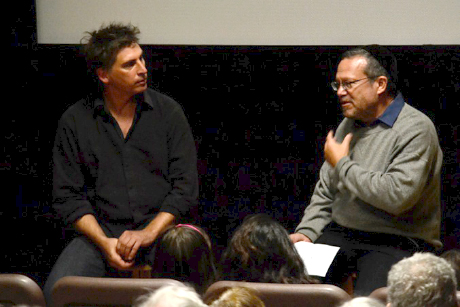Memory and music: A Holocaust story
By Linda B. Glaser

The evening at Ithaca’s Cinemapolis theater Oct. 22 began with a moment of silence for Dina Jacobson, survivor of three years in Auschwitz. Jacobson spent 23 years telling her story to thousands of people before she died in June at age 92. The audience had come to hear her story in a new documentary, “Blue Tattoo,” and to participate in a community conversation led by Jonathan Boyarin, Cornell’s Mann Professor of Jewish Studies in the College of Arts and Sciences.
High school students and other members of the community also came to hear singer-songwriter Joe Crookston, whose song about Jacobson, “Blue Tattoo,” inspired the documentary. Crookston calls himself a “social archaeologist.”
“I love to talk to people and hear their stories,” he said. “Personal stories remind me how connected we are in a fragmented world.”
The film interweaves Jacobson’s story – and her telling of that story – with chilling footage from Holocaust archives. Filmmakers Marty Kerker and Rich Kellman also document Crookston’s meetings with Jacobson and his crafting of the song about her, which Crookston structured as a dialogue between Jacobson and her daughter, Connie. “I didn’t feel I had any right to be the narrator of her story,” he explained.
In his comments after the film, Boyarin noted that people, especially in Europe, don’t necessarily want to hear about what happened in the Holocaust. “But the real problem in this country is not hostility, but ignorance or complete indifference,” he said.
Boyarin invited the audience to consider whether anything troubled them about hearing the story in the form of a film. He pointed out that Jacobson, who died six weeks after she saw the film’s premiere, had said because of the film she no longer had to keep telling her story. After her death, the documentary became something different, without an “embodied” aspect to its memories.
One audience member said that he liked the film because it made him feel like he knew Jacobson, and unless you know a survivor of the Holocaust, it’s hard to get close to the experience. Another commented that it was clear there had been a transfer of ownership of Jacobson’s story to the high school students who heard her talk.
And although we’ll never know what the high school students will do with what they learned, “it planted a seed,” said Boyarin.
Linda B. Glaser is a staff writer for the College of Arts and Sciences.
Media Contact
Get Cornell news delivered right to your inbox.
Subscribe